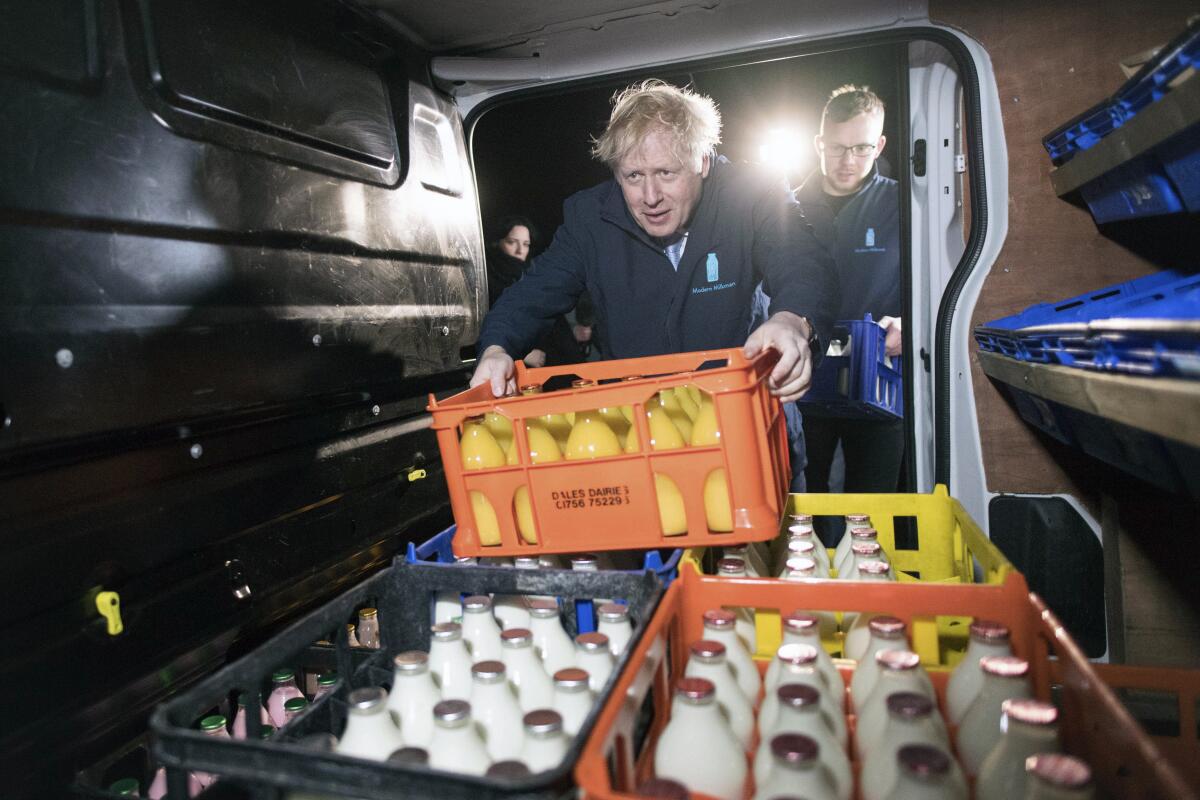Undecided voters are key target on eve of British election

- Share via
LONDON — British political leaders zigzagged across the country Wednesday on the eve of another national election, making a last-ditch push to win over millions of undecided voters who could determine the outcome.
Although opinion polls have consistently shown Prime Minister Boris Johnson ‘s Conservative Party in the lead ahead of Thursday’s vote, surveys suggest the margin may be narrowing. All of the U.K.’s political parties are nervous about the verdict of a volatile electorate that has grown weary after years of wrangling over Brexit. Voters appear increasingly willing to abandon long-held party loyalties in order to back their deeply held feelings about Britain’s impending departure from the European Union.
All 650 seats in the House of Commons are up for grabs in the election in Britain’s first December vote since 1923, which is being held more than two years early in a bid to break the political impasse over Brexit.
Johnson has tried to remind voters of the potential for further political chaos if they pick another divided Parliament, which would endanger his plan to get lawmakers to approve his Brexit divorce deal and lead the U.K. out of the EU on Jan. 31.
He started his day before dawn, helping load milk and orange juice bottles onto a delivery vehicle in northern England. It was the first of half a dozen campaign stops for the day.
“This could not be more critical, it could not be tighter,” Johnson said of the vote. “I just say to everybody, the risk is very real that we could tomorrow be going into another hung Parliament. That’s more drift, more dither, more delay, more paralysis for this country.”
Later, watching pies being baked at a catering firm in central England, Johnson said, “[I]f we can get a working majority, we have a deal, it’s ready to go.”
“We put it in, slam it in the oven, take it out and there it is — get Brexit done,” he said.
The main opposition Labor Party said the most recent polls showed that momentum was moving in their direction. The party has tried to shift attention from Brexit and onto its plans of reversing years of public spending cuts by the Conservatives, who have been in power since 2010. Labor candidates want to talk about jobs, schools and the country’s beloved but struggling National Health Service.
Labor leader Jeremy Corbyn campaigned in Scotland on Wednesday, urging people to elect a government that would “give real hope.”
“In this city of Glasgow, which has some of the poorest people in this country, has wards which contain the lowest life expectancy all across this country. They need an end to austerity,’’ Corbyn said. “They need a U.K. government that will invest all across the country.”
For many voters, Thursday’s election presents an unpalatable choice. Both Johnson and Corbyn have personal approval ratings in negative territory and both have been dogged by questions about their character.
Corbyn faces allegations that he has allowed anti-Semitism to spread in his left-of-center party and is seen by some as a doctrinaire, old-school socialist.
Johnson’s Tories secured endorsements Wednesday from right-leaning newspapers including the Times of London, the Daily Telegraph, the Daily Mail and the Sun, which called Corbyn “an unprecedented threat to our country.” The left-leaning Daily Mirror and the Guardian newspaper backed Labor.
Corbyn accused “some in the media” of attacking his party.
“But I tell you this — our skills, our principles and our determination are stronger than ever,” he said.
Still, some Labor members and candidates fear that Corbyn’s hard-left views are an electoral turnoff. Labor was embarrassed Tuesday by the leak of a phone recording of its health spokesman suggesting that the party would lose Thursday’s election because voters “can’t stand Corbyn.”
Jonathan Ashworth said his unguarded remarks were merely banter with a Conservative friend.
For his part, Johnson has been confronted with his past offensive comments, broken promises and lies. This week he was caught seeming to react unsympathetically to a picture of a sick 4-year-old boy who was lying on a British hospital floor because no beds were available.
Johnson ally Michael Gove claimed Wednesday that the prime minister was deeply concerned with the boy’s plight but had suffered “a single moment of absent-mindedness” that was caught on camera.
More to Read
Sign up for Essential California
The most important California stories and recommendations in your inbox every morning.
You may occasionally receive promotional content from the Los Angeles Times.













